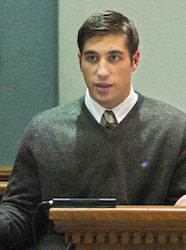Shortly after he was released from 18 years – half his life – on Arkansas’s death row, we met with Damien Echols in the American apartment of director Peter Jackson and writer-producer Fran Walsh. The celebrated New Zealand filmmakers had championed the quest for exoneration of the West Memphis Three – Damien, Jason Baldwin and Jessie Misskelley, Jr. – and had turned over their spacious flat to Damien and his wife, Lori Davis, as they set about building a new life and getting Damien acclimatized to a world that hadn’t existed when he went behind bars in 1993. Until his release, Lori, who met and fell in love with Damien while he was in prison and who carried out an impassioned fight to prove his innocence, had never been able to spend a night with him until he was freed.
Over lunch, we were struck by something Damien said: “Ours was not an unusual case. We just got lucky that two guys [Joe Berlinger and Bruce Sinofsky] decided to make a film about us [Paradise Lost, which eventually became a trilogy of films for HBO].
It staggers the imagination to think of Damien as being “lucky,” spending all of his formative years behind bars with the prospect of death looming over him, but in this context he is absolutely right.
The validity of Damien’s statement was born out this past week with the release of 29-year-old Ryan Ferguson from the Jefferson City, Missouri Correctional Center.
Mr. Ferguson was convicted of the November 1, 2001 murder of Columbia Tribune sports editor Keith Heitholt as he walked out to the newspaper’s parking lot shortly after 2:00 a.m. Heitholt was struck from behind and then strangled with his own belt. A police dog traced a scent to a University of Missouri dorm where Ferguson and his friend Charles Erickson were living. Police questioned a janitor, Jerry Trump, who said he witnessed the crime but could not identify the perpetrators.
Two years later, in a “confession” that would presage the coerced statement Amanda Knox would give the overbearing and intimidating police investigators in Perugia, Italy, Erickson told police he had “dream-like” memories of the crime, implicating both himself and Ryan Ferguson. At the trial, Trump, who had gone to prison a month after the murder for a parole violation, said his memory had been jogged by a newspaper article his wife had sent him about Heitholt’s murder.
What does this case have in common with the West Memphis Three and Amanda Knox-Raffaele Sollecito murder trials that we covered extensively in Law & Disorder? Plenty.
There was no physical evidence linking Ferguson to the crime scene.
There was no matching DNA.
There was no motive.
There were no reliable witnesses.
There was an unreliable confession.
Ferguson had no history of violence or any antisocial behavior.
What finally got Ferguson sprung from his 40 year sentence was the revelation that prosecutors had interviewed Trump’s wife, who denied she had ever sent him such an article about the murder. In a summary of her decision, Judge Cynthia Martin wrote, “The undisclosed interview was material, resulting in a verdict that was not worthy of confidence.”
Several members of the original jury that convicted Ferguson agreed. Missouri Attorney General Chris Koster stated that he would not retry the case.
So at 29, Ryan Ferguson is finally free, having been robbed of the entire decade of his twenties. There is some question as to whether the prosecutor intentionally withheld this crucial element or simply didn’t think it was important. Either way, it translated into a massive miscarriage of justice.
In 1935, in the case of Berger v. United States, the Supreme Court ruled that the prosecutor has an obligation above that of seeking a verdict of guilty, and that is to assure that the innocent not suffer.
“It is as much his duty,” Justice George Sutherland wrote in delivering the court’s ruling, “to refrain from improper methods calculated to produce a wrongful conviction as it is to use every legitimate means to bring about a just one.”
If there ever were more important instructions given in the conduct of criminal proceedings, we don’t know about them.
Because we can’t count on every defendant being as “lucky” as Damien Echols.




























I’m starting to have less and less faith in our judicial system, so sad.
Great news. That was a long hard struggle for Ryan, his father, and supporters.